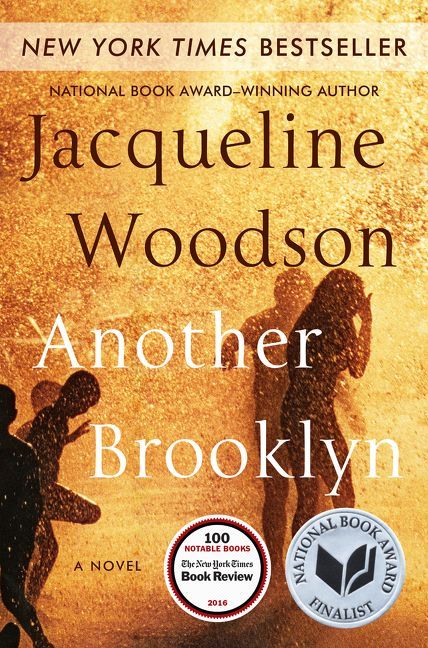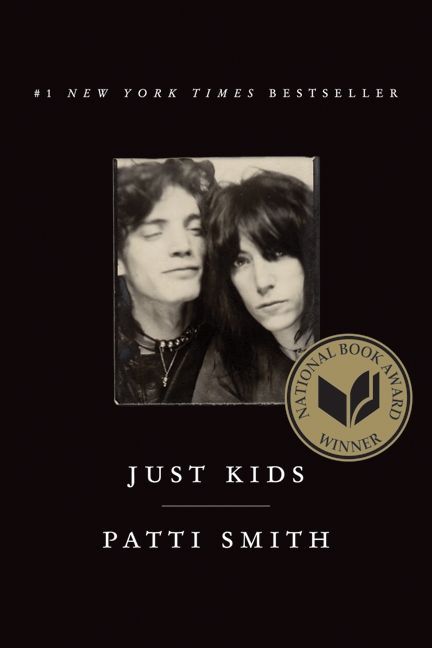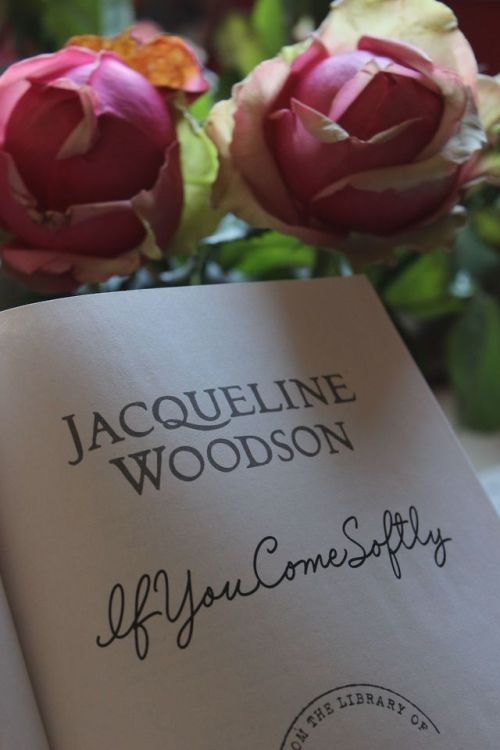This memoir-in-verse is an absolute gem. The whole time I read it, I wished I were a middle school English teacher so that I could assign it and then talk about it for a month. But, since I haven’t the patience to be a teacher, here’s a few thoughts instead.

Star Ratings for Nonfiction
Writing: ***** (5 stars)
Narrative: **** (4 stars)
Interesting Subject: ***** (5 stars)
Objectivity and research: **** (4 stars. This is a memoir.)
Overall: **** ½ (4 ½ stars)
Age Range Recommendation: 10 and up
Review by Morgan
The general subject of Brown Girl Dreaming is a simple one. Jacqueline Woodson (award-winning author of Feathers and many other good books) remembers her earliest childhood days, growing up in both the North and South in the ’60s and ’70s. Starting with her birth to the Woodsons in Ohio, she chronicles the separation of her parents, a big move down to her mother’s old home in South Carolina, summers with her grandparents, and then the beginnings of a life in New York City. Five parts of the book categorize these phases in Woodson’s memory, and the pieces of her childhood are remembered through easy-flowing poems, each only a page or two long.
Aunts, uncles, neighbors, and family friends filter in and out of the cast of characters, while Jacqueline writes about her mother, grandparents, and siblings in evocative detail. Sometimes when you read a great work of fiction, you start to feel like the imaginary characters were once real people. In Brown Girl Dreaming, these very real people have such memorable personalities I had to remind myself that they weren’t just made up to suit the story.
It’s obvious that Jacqueline had a keen observant eye even before she could read. Re-told conversations and scenes between grown-ups give the reader an idea of what it was like to grow up during a big push in the civil rights movement, even when most of the action happened on the periphery of the Woodson siblings’ younger lives. Little moments in the South, where passive-aggressive hostilities still ran rampant even after segregation was technically supposed to be over, made me grit my teeth in frustration, while the hopeful forward-movement inspired by Jacqueline’s mother and her friends buoyed my spirits. There’s a great image of Jacqueline and her friend walking around NYC with their fists in the air like Angela Davis, and also a wonderfully moving poem which compares the revolution to a carousel: history always being made somewhere, while different people have a part in it.
But, this being a memoir about her own experiences, the political atmosphere is enveloped by a narrative about growing up. Jacqueline grows to find her voice, to discover a love of words, and to see how her family’s every-day lives can be the stuff of wonderful stories. She’s not just a Brown Girl Dreaming, she’s a brown girl learning, speaking, changing, and – most importantly – writing. And all that scribbling in notebooks has definitely payed off; the simplicity of these poems doesn’t diminish the strength of their message. In fact, each word seems carefully chosen to reflect the temperament of her thoughts at the time. It’s rare to read a memoir in which the grown-up writer can conjure up visions of her childhood without a tint of romanticism or regret. I feel like I got a chance to meet the real child Jacqueline Woodson once was, and to hear her voice as though she was speaking just to me. For this reason, even though there wasn’t a hugely dramatic plot, I found the entire story enchanting.
While the time-period was tumultuous, and the Woodson siblings had to keep picking up their lives as they moved, this is not a melodramatic story. The poems are written with an earnest, child-like simplicity that captures the tone of happy summer evenings and anxious walks to school. There are funny memories, and profound moments, and a general warmth of spirit throughout the whole book. I loved little Jackie. I loved her family, because it was impossible not to feel how much she loved them, too. Memory is a tricky thing, and that’s a big theme throughout Brown Girl Dreaming: the logical conclusions we draw as children don’t always hold up against reality. I can only imagine how much digging Woodson must have had to do –through her own recollections, as well as the history of her families and the places where she once lived – in order to distill this sincere memoir from her past. I’m very grateful that she gave it so much thought, because the resulting book was an absolute pleasure to read.
I will be recommending Brown Girl Dreaming to pretty much every child/parent/teacher who enters my store. It’s thoughtful, it’s funny, and it’s easy to relate to Jacqueline even though she grew up in a much different time than this one. Anyone who has ever called more than one place home; who has worried about their parents; competed with their siblings; and tried to figure out how they fit into their world, will see something of themselves in these poems. I have too many favorite poems to list, all dog-eared in my book. (I try never to wrinkle the pages but too bad! These pages need to be remembered.) Once the book officially hits shelves on August 28, I’ll probably be reading certain pieces at unsuspecting customers. And as long as my terrible elocution doesn’t drive them away, I think this book will be a hit. There’s lots to talk about in it, and even more to enjoy.



